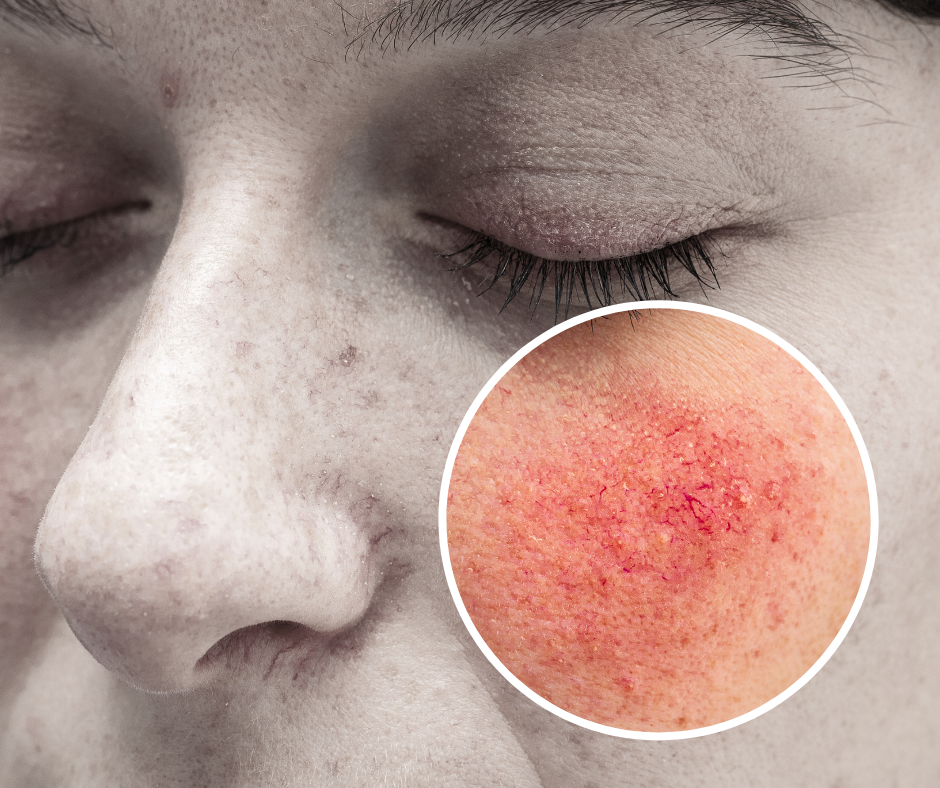Rosacea
What Is Rosacea?
Rosacea is a prevalent chronic inflammatory skin condition that causes redness and flushing, primarily on the face, but can also affect other parts of the body. It can present different depending on the type and may include persistent blushing, pimples, swelling, thickening of the skin, skin irritation, visible blood vessels, and can also affect the eyes and nose.
Rosacea can appear at any time, especially if there is a family history of experiencing symptoms, but tends to mainly appear between the ages of 30-50, affecting more women than men, and tends to be more prevalent in lighter skin tones (however, darker skin tones make a diagnosis harder to spot).
While there is no current cure for rosacea, symptoms can be managed and lessened with treatments available at SkinHD.

Symptoms
- Skin sensitivity – early stage rosacea can cause heightened sensitivity where skin is easily irritated by new or previously tolerated products. This can feel like a burning, stinging or a tightening sensation.
- Persistent redness or flushing – commonly across the nose, cheeks and forehead, but can also appear on chest/neck.
- Bumps and pimples – small red bumps or pustules may develop, often mistaken for acne.
- Visible blood vessels – also known as thread veins, can become more prominent.
- Eye irritation – redness, swelling, and irritation can affect the eyes.
- Thickening of the skin – usually around the nose (rhinophyma) causes the nose to become enlarged and bulbous in appearance.

Causes
The precise causes of rosacea are currently unknown, but several factors are believed to contribute:
- Genetic predisposition – family history increases the likelihood of developing rosacea.
- Underlying medical conditions that can cause issues with blood vessels, making skin more prone to flushing. An overactive immune response can also play a role in increasing inflammation in the skin.
- Environmental stresses – such as pollution and harsh weather conditions can irritate the skin barrier and worsen symptoms.
- Dermodex mites – these are microscopic mites that usually live on the skin without any issue. Some people are more sensitive to these mites, or have a higher number than usual. It is unknown if this is a direct cause or a symptom of rosacea.
- Bacterial exposure (H.pylori) – commonly found in the digestive tract, some studies have shown that this germ can cause an increase in dilation of blood vessels, causing the skin to look flushed.
Certain triggers can worsen symptoms and vary between individuals. Keeping track of when symptoms present can help avoid flare-ups. Possible triggers include:
- Sun exposure
- Stress
- Hot or cold temperatures
- Alcohol, spicy food or hot drinks
- Exercise
- Certain skincare or haircare products
- Hormonal changes (pregnancy/menopause)
- Some medications
Recommended Treatments For Rosacea
While there is no cure for rosacea, treatments can help to reduce symptoms and the frequency of flare-ups. Treatment plans vary depending on the severity and type of rosacea, so a consultation with a SkinHD practitioner can help determine the best course of action.
Why choose SkinHD for my Rosacea treatments?
- Over 20 years combined medical knowledge and experience
- Champions of natural looking results
- Honest and genuine advice – we’ll never suggest treatments you don’t need!
- No hard-sells or pushy sales techniques
- Friendly and family run clinic in South Manchester
- Loyalty programme, earn as you spend, referral scheme and birthday bonuses!
- Payment options available through Klarna
